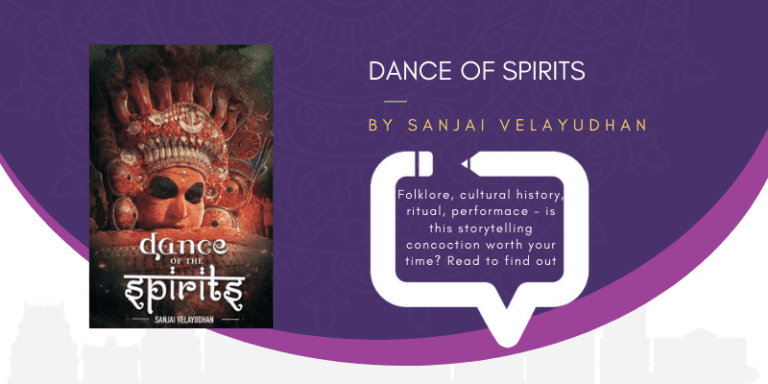“No, it was not very hard to fall in love with Karna, however unsuitable a suitor he was condemned to be.”
Yes, it isn’t hard to fall in love with someone like Karna – with his kavach and kundals, with his physique of a warrior and with his God-like aura. However, how hard is it to fall in love with a man whom society deems as the ‘outcast’? Can love be a good enough reason for a princess to leave behind a childhood of royalty and choose the hard way as the life of a sutaputra?
In Karna’s Wife – The Outcast Queen, Kavita Kané tries to answer precisely these questions. The story revolves around Karna’s wife – Uruvi. Whether she actually exists in the original epic or is a fictitious character is still a point of contention amongst scholars.
Read this alternative view on his marital status.
The novel, using a simple yet engaging narrative, takes us through some important themes of the epic, which hold relevance even today.
We encourage you to buy books from a local bookstore. If that is not possible, please use the links on the page and support us. Thank you.
Plot
“The story of his life was a fairy tale gone wrong.”
Uruvi, the princess of Pukeya falls in love with Karna at first sight. Her parents, devastated after having heard that their daughter is in love with an outcast, try their best to convince Uruvi to not marry him. Uruvi, however, ends up marrying Karna, knowing that the way Karna is deemed a ‘misfit’ in their society, she will also be a misfit in his domestic world.
Like all his other family members, she tries very hard to convince Karna about the consequences of siding with Duryodhan, but to no avail. In being the wife of a person hated by everyone, Uruvi discovers how even the morally upright are full of contradictions and hypocrisies. However, will she be able to change Karna’s fate?
Perspectives on War
“What good has war done except give satisfaction to those seeking vain glory?”
Who is a war for? Is there a right in a righteous war? Can there be a wrong in such a right war? For Uruvi, whose father and husband both took pride in war’s victory, these questions were pertinent from childhood itself.
For the ruler and the warrior, war brings prosperity. However, for Uruvi, it brings only devastation and loss to the family of that king and warrior. From a very young age, she took to healing soldiers wounded in the war. She would often ask her father, “Is this the fruit of war?”
The fact that a person can feel victorious and proud after having killed numerous people on the battlefield made her cringe since childhood.
Later in life, even as her husband Karna basked in war’s glory, she would silently tend to the victims; her small way of making amends.
Her stance was simple; wars should never be fought. But her father, King Vahusha thought differently; to him, a righteous war cannot be wrong, there is no sin in defending oneself from an enemy, and if defence calls for war, so be it. Hence, sometimes, like is true in the case of Pandavas, war is the only solution – not only to defend themselves but also to seek vengeance for the years of injustice levelled on them.
As the Kurukshetra war unfolds, Uruvi remarks – “I knew the war was a killer, but does it turn men into such hideous fiends?”
Yes, the Kauravas have been unjust, but how fair was Krishna when he killed King Sindhu, giving him an illusion of an evening sky? Was it just for Krishna to use Bhima’s son as collateral damage to save the life of Arjuna? Was it moralistic for Yudhishthira to lie about Ashwatthama’s death and thereby kill Dronacharya?
The hypocrisies of society
“Is it easier to live an honourable life by murdering your daughter’s happiness in the name of “honour” and family pride?”
As most re-readings and retellings of ancient texts will reveal, this one too highlights the hypocrisy of traditional society.
When King Vahusha learns about his daughter’s inclination towards Karna and her complete refusal to marry anyone else, he is faced with a dilemma. Society, just as imposing as it is today (cue: Indian Matchmaking), wouldn’t let a father, that too a king, keep his daughter unmarried. On the other hand, the same society would never approve of her marriage to a sutaputra, a perceived low caste.
Uruvi is swift to remind him that he isn’t the wrong man, but the wronged man. It is a society which has branded Karna notorious for being a low-caste – a misfit in the world of royalty. Uruvi’s quarrels with her parents on marrying Karna lead the reader to a societal problem that is relatable even today – how just is it to murder the happiness of a child in the name of ‘honour’?
If Uruvi’s arguments with her parents show us how, even in today’s world, social standing is an important consideration of marriage, Uruvi’s swayamvar becomes a microcosm of the society itself – then and now. Uruvi’s choosing Karna in her swayamwar causes a disruption in the hall – many of the princes, including the Pandavas, are enraged; a reaction sadly neither of us is alien to even in 2020.
Another deeply etched contradiction that Karna’s Wife brings to the surface is that of morality. It is true that Karna took the side of evil, but were the Pandavas, Guru Dhronacharya and others moralistic in their doings? Guru Dronacharya defies the morals and dharma of a teacher by being unjustly partial towards Arjuna. True, during the dice game, Karna was immoral in asking Draupadi to be brought to the hall by force and then in assassinating her character. However, does that fact discount Yudhishthira’s act of pawning his kingdom, his brothers and then his wife away in a game of dice? Can we let the Pandavas get away with the fact that they were unable to protect their wife as she was humiliated in a hall full of people? Having pondered on all these points, it doesn’t then appear surprising when Uruvi’s mother remarks, “I thanked God that you were Karna’s wife and not Arjuna’s.”
So if Karna falls prey to society’s hypocrisies and to the misplaced morals of the Pandavas, Kunti isn’t far behind. Too afraid to be denounced in a society where an unmarried mother is considered ‘unvirtuous’, Kunti had to abandon her son. The fear of society is such that it can let a mother forsake a son so that her image of ‘virtuosity’ is not tarnished. So, Kunti appears to be a paradoxical mother, who has loved her five sons so tenderly but deserted her eldest.
Karna and Arjuna
“Lineage matters over merit.”
The tussle between Karna and Arjuna (often romanticized in fanfiction) perfectly personifies the battle of castes in society. Arjuna becomes the quintessential example of how racism favours one class over another.
He is seen as the best warrior to walk the earth and is everyone’s favourite – from Guru Dronacharya to Bhishma Pitama, even though Karna outperforms him several times, including at Draupadi’s swayamvara.
Karna’s Wife, and him
“Gratitude is a fine quality, but in Karna, it is misplaced.”
If Karna has been reproached for something other than his caste, it is his friendship with Duryodhan. All his well-wishers, including his parents, brother, and Uruvi have tried to make him see reason – that an alliance with Duryodhan is an alliance with evil. However, to him, who was rejected by everyone, Duryodhan’s proposal of friendship was like water on parched land. He, who has always felt the need to be socially respected, was finally given that respect by Duryodhan, in public no less. How then, can he not be loyal towards him?
Conclusion
Karna’s story is a fairy tale gone wrong, steeped in issues we have only recently begun to understand (re: racism), whose fate was decided when he chose loyalty over morality.
At the end of the day, this is among the most tragic love stories (its mythological inconsistency notwithstanding). Uruvi, having known Karna and her fate for a long time, chose to fight bravely for her love. Karna’s Wife beautifully shows two individuals confronting the inevitable.
Author Kavita Kané has shown us a new and beautiful perspective of the epic, making us question the hypocrisy of our society, and the inevitability of war, but also making us fall in love with Uruvi and her outcast husband.
Favourite Quote
No, not the wrong man, but the wronged man.






















